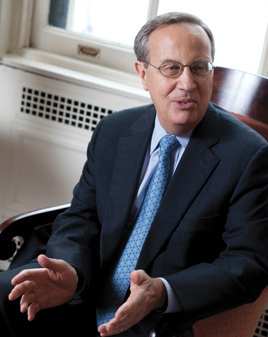 loading
loading
Q&A: Rick LevinThe $3.5 billion deadlineAn interview with Yale president Richard Levin ’74PhD  Mark OstowView full image
Y: Yale is in the last stage of its current capital campaign. You have a year to raise the last $500 million. Are you going to make it? L: I’m very confident. We will close this fiscal year in excess of our original campaign goal of $3 billion. Right before the market fell apart, in the spring of 2008, we raised the goal from $3 billion to $3.5 billion. So we have made the original goal with a year to go. The question is: can we pick up the pace this year sufficiently to hit the new goal? During the last two years, since the crash, we’ve been raising $300 to $400 million per year. But earlier in the campaign, we raised $500 to $600 million per year. It will take work to raise $500 million in this environment. But Yale alumni are responsive and enthusiastic, and I’m sure there will be many people out there who want to play a part in helping us to reach our goal. Y: Of course, it’s standard in a capital campaign that you raise the bulk of the money in the early years. As we discussed in a previous interview, 10 percent of the donors give 90 percent of the money, and they’re approached first. L: The pattern of these campaigns is that they run seven years. Two years are a silent phase before the launch, and then there are five years of the formal campaign. Typically, we get a great start in the silent phase. And typically, we pick up in the last year —because it will have been five years since many of our most generous donors made their campaign commitment. The great majority of them will have completely paid off their original commitment, and some will entertain a second gift. So, one of our hopes is that some of the people who were there in the beginning will help us make the goal at the end. Y: How is the rate of alumni giving to Yale overall? According to the U.S. News and World Report statistics, it dropped a little recently, from 43 percent to 41 percent. L: The initial impact of the recession did reduce participation modestly. Annual giving dollars—for current use—declined as well. But this year there was a lot of effort made on the annual fund solicitations. By mid-June we were $2 million ahead of last year, and on track to return to the level of two years ago. Y: I got an e-mail solicitation from you for the alumni fund in late May. Is that usual? L: Normally I don’t send out a solicitation late in the year. But this year, with the recession and the budget reductions we had to undertake, we thought that it would be a good time for an update message. So we sent this out the day of commencement, as a year-end reminder for people to think about. Y: And what about the 10 percent who give the most money? Have you seen a drop there? L: Yes, the last two years we’ve seen a significant drop-off in major capital gifts. But our loyal donors almost never say no. They just say, “Not now.” One encouraging sign is that our cash giving this year has been up. During the first year of the recession many people postponed their pledge payments. This year people are catching up. And so I think that, as the economy recovers and as we approach the close of the campaign, we’ll see some of the people who have held off for the last two years step up and make additional contributions. Y: And how’s the endowment performing? L: Much better than last year. It will be positive on the year, and ahead of where we forecast for budgetary purposes. Because we’re so heavily invested in private equity and real assets, and because those categories are not up as dramatically as public securities markets, we will not experience increases at the rate of, say, the S&P 500 over this fiscal year. So we’ll do less well than some schools that have a traditional stock/bond portfolio. But we’re very well positioned for the future. Even at the very bottom of the recession, our performance for the last 10 or 20 years was still far better than any of our peers’ and certainly far, far better than traditional stock/bond portfolios. Y: Isn’t it going to hurt, just a little bit, when you put out those numbers and the media reaction is “Yale underperforms the S&P 500”? L: It’s inevitable with the type of strategy we’re following. It’s going to happen once in a while. We will continue to do better over longer periods; it would be foolish to focus on one-year returns. Y: What if Yale doesn’t make the goal on June 30, 2011? Will the campaign be extended? L: We’re going to make it. The staff and campaign committee are working really hard, and I’m giving more time in order to make sure this happens. It will require effort, but I believe we can make the goal on time. Y: Once the capital campaign is over … L: We keep right on raising money. Contributions are the lifeblood of this institution and if we’re going to continue to innovate, develop new programs, and take on the challenges of the years ahead, we need to continue to raise funds.
The comment period has expired.
|
|